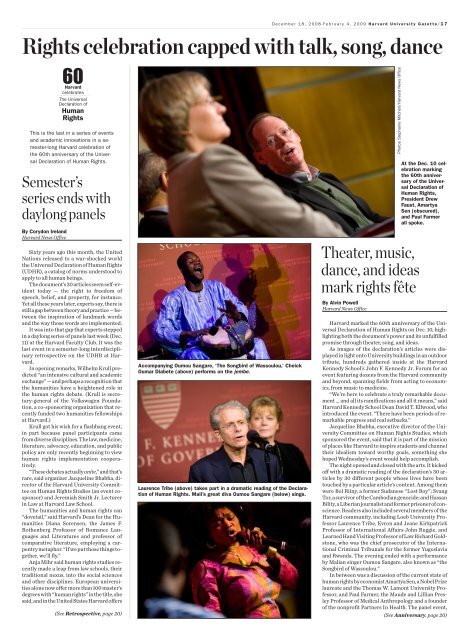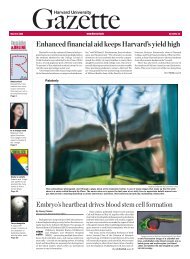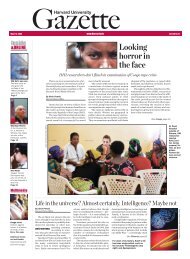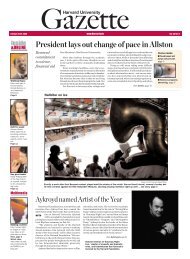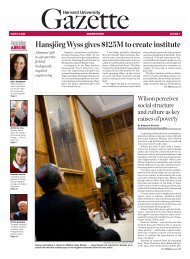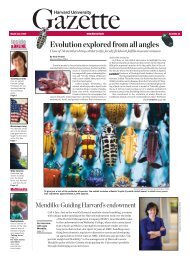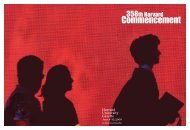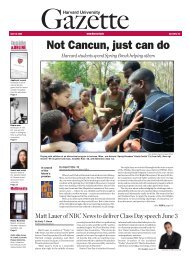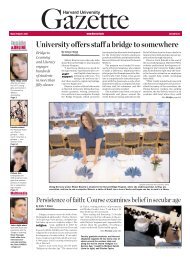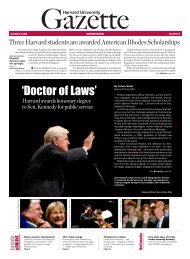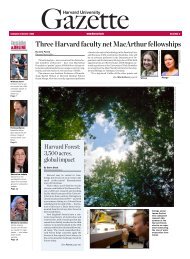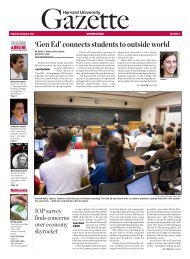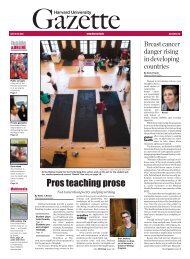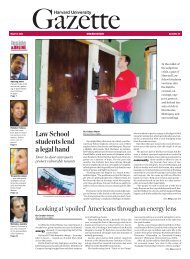16/ <strong>Harvard</strong> University Gazette December 18, 2008-February 4, 2009Watson(Continued from previous page)of a succession of poor men who visit himfor gifts of corn, in return for the priest’spromise of a higher price for his grain.So the first poor man, named “Our,” arrives.Then the second, named “Father,”and so on, until after one exhausting nightthe ploughman has memorized what —when strung together — is the Lord’sPrayer.“Six thinges” and the story of theploughman are far apart in time and intent,but both illustrate that literacy was a“moral skill before it was a practical skill,”said Watson. By the 18th century, he said,DigitalAmir Karger (fromleft), Therese CelineCondit, and ElahehKheirandish participatein the DigitalHumanities Fair inthe Barker Center’sThompson Room.(Continued from page 13)Bill and Carrie were part of a display bythe Academic Technology Group (ATG) at<strong>Harvard</strong>, a resource for technology-enhancedteaching and learning tools. Thoseinclude virtual worlds and video, along withthe clickers, wikis, and discussion boardsused in collaborative learning environments.The ATG, an arm of the Faculty of Artsand Sciences (FAS) Information Technologygroup, creates course-specific multimediaWeb sites, including a recent virtualworld of 17th century <strong>Harvard</strong> for archaeologystudents.The Derek Bok Center for Teaching andLearning had a display, pointing to, amongother things, its courses and seminars onWeb pedagogy.Visitors took in a lesson on the <strong>Harvard</strong>University Library’s Visual InformationAccess, with its contributing collections ofimages on horticulture, Hellenic studies,medicine, business, law, zoology, and more.The <strong>Harvard</strong> Division of Continuing Educationhad a table set up, with expertsready to talk to faculty about the experimentalreach of its 120 online courses, andits longtime investment in distance education.In some cases, digital resources at <strong>Harvard</strong>have been accelerated or expanded becauseof an FAS vote in February on openaccess to scholarly literature. It requires<strong>Harvard</strong> faculty members to submit anelectronic version of scholarly articles tothe Provost’s office for an online repository,where they will be available free.In June, <strong>Harvard</strong> plans to “open therepository to the world,” said Amy Brand,program manager in the <strong>Harvard</strong> UniversityLibrary’s new Office for Scholarly Communication.“The nice thing about a digitalliteracy would become what it is today, “asecular, and economic, ideal.”The vernacular theology of MedievalEngland was a battleground of <strong>two</strong> broadreligious views of salvation. The “perfectionist”view held that only the few, and theintensely educated — like the monks of old— could be saved. The “universalist” view— more tolerant, open, and flexible — heldthat even “mediocre” (uneducated) Christianscould be saved.Occasionally, expressions of the universalistview seemed not just tolerant, butradically inclusive, said Watson.To illustrate, he read a passage fromarchive, as opposed to a physical archive, isthat we can make it visible and accessibleto the wider world.”Her office’s DASH repository — as in,Digital Access to Scholarship at <strong>Harvard</strong> —is now only available to members of the<strong>Harvard</strong> community as a beta test, she said.But by this summer, DASH will be accessibleto anyone worldwide throughGoogle Scholar and other online indexingservices.In May, <strong>Harvard</strong> Law School (HLS) instituteda parallel open-access requirementfor its faculty scholarship.<strong>Harvard</strong> University Press (HUP) is alsoexploring open access, said Daniel Lee, directorof digital content development.Early next year it will publish the first onlineissue of the “Journal of Legal Analysis,”a peer-reviewed, open-access journal sponsoredby HLS.At the end of next year, the 2009 journalarticles will be published in a print-ondemandvolume, said Lee. Bringing digitaltools to the humanities, he said, “is aboutchanging modes of access to scholarly research.”Nearby, Ben Lewis, a senior GIS specialistwith <strong>Harvard</strong>’s Center for GeographicAnalysis, tapped a few computerkeys to call up a detailed map of Africa. Tothe north, it was dotted in red with the locationsof 30,000 water wells.Geographical information systems, orGIS, can provide a robust platform for humanitiesresearch, said Lewis. “This exactspot on the Earth,” he said, pointing down,is not just a coordinate — but the locus of“all kinds of human things.”For example, his office’s AfricaMap project— launched just <strong>two</strong> weeks ago — candeepen a scholar’s understanding of anexact place by layering it with historical, environmental,and economic data, as well asWilliam Langland’s visionary narrativepoem “Piers Plowman,” written around1380, in which a feminized Christ bade all— Muslims, Jews, and fallen Christiansalike — to “souke for sinne salve [remedy]at his breste.”But how revolutionary was medievalvernacular theology — that is, how muchdid it influence the modern era?Watson is not prepared to say, but in theend did assert that it was a “potent andunder-recognized phenomenon” that deservesmore investigation.corydon_ireland@harvard.eduKris Snibbe/<strong>Harvard</strong> News Officelinks to recent research and even rich databases.The content of AfricaMap is African, butthe same layered, rich mapping framework— “geographic switchboards,” Lewis calledthem — “can be applied anywhere in theworld.”These kinds of maps, stacked with researchand data from many different disciplines,allow researchers to see each other’swork, and invite intellectual interplayamong fields as diverse as policy, health, thearts, history, and linguistics.“It’s all about layers,” said Lewis of GIStools for the humanities, “and it’s all aboutconcurrence in actual space.”The center, he added, plans a one-daytraining session for <strong>Harvard</strong> faculty membersin March.Many of the fair’s visitors took time tomake Bill walk around with the up anddown arrow keys on an Apple computer.(Carrie — in reality Caroline M. “Carrie”Kent, head of research services at WidenerLibrary — was moving herself around froma remote location, and busy typing answersto interactive queries.)The Islamic folios on display numberedonly 12, but there is “no limit to the numberof pages you can add,” typed Carrie,whose redheaded avatar moved around in astylish black body stocking. It’s all aboutnew opportunities for “contextualization,”she added. “You could put on display togethermanuscripts from around the worldthat you could never, in real life, see together.”Carrie, the avatar, offered one guest atrip to a virtual <strong>Harvard</strong> College library. Itwas set whimsically in an open-air portico,where a waiting lounge chair pointed to anearby faux sea.“Hold on,” said Carrie, “and I will transportyou.”Rainer(Continued from previous page)she tried to make it “easier” for the spectatorto see in a range of ways: for example, by usingrepetition or a follow-the-leader structure sothe viewer had many opportunities to see aparticular dance phrase. Later in her career,however, Rainer made it more “difficult” forthe audience to see by creating dances withlittle to no repetition. In “Trio A,” one of hermost famous works, the dancers do not repeata single move.“It’s very difficult to get your bearings asyou watch this dance,” Lambert-Beatty says.“There is just movement after movement. …You never feel like you’ve seen it all.”Rainer’s efforts to modify the viewing experiencereflected contemporary cultural developments,says Lambert-Beatty.“In the 1960s, artists were reckoning withthe transformation that had occurred withthe rise of TV,” she says. “As media coverageof the Vietnam War intensified, this reckoninggot a kind of urgency. I think that consciouslyor not, artists who worked with displayinga body to a viewer were heavily impactedby the televisual experience of thewar.”As an example, Lambert-Beatty cites astrategy that Rainer developed in 1968 called“performance concurrence.” Rainer wouldchoreograph multiple dances to take place indifferent locations at the same time. Performanceattendees would receive a map ofroom locations and a schedule, not unlike aTV guide. Because the dances were concurrent,attendees had to make a conscious decisionabout what to watch.“Rainer set up the condition where theviewer would be aware that something isgoing on that he or she is not actually seeing,”says Lambert-Beatty. “This was an artistic‘working through’ of life in a media culture.”Rainer also incorporated media culture ina more direct sense. She often projected filmsduring her dances, or had performers imitatepositions from photographs or actions frommovies.“Being Watched” traces Rainer’s treatmentof the spectator from her earliest, minimalis<strong>two</strong>rks to the politically charged productionsshe created in the 1970s. Writingabout spectatorship was challenging, Lambert-Beattyacknowledges, but she was able todraw on a rich body of source material to informher scholarship.“With dance, the performance itself isgone,” she says. “I was considering ar<strong>two</strong>rkthat by its very nature no longer exists. So, Ihad to rely on traces like any performancehistorian.”Lambert-Beatty drew on photographs,performance films, and interviews with individualswho had seen Rainer’s works performedlive. She was also able to watch reconstructionsof certain performances.The most helpful information, however,came straight from Rainer herself. In 1997,Lambert-Beatty was a fellow at the WhitneyMuseum of American Art’s IndependentStudy Program in New York. She was interestedin performance art of the 1960s, and hadplans to write about several artists from thatera — including Yvonne Rainer, who teachesregularly at the program. The pair met frequentlyduring Lambert-Beatty’s fellowship.“It was wonderful,” says Lambert-Beatty.“I was able to make <strong>appointments</strong> to sit downwith Rainer and discuss her work at length. Icame away feeling that there was so much tosay.”Those long conversations altered Lambert-Beatty’splans a bit. The other artistswould have to wait — Rainer’s groundbreakingapproach to spectatorship begged its ownbook. The result? “Being Watched.”esimon@fas.harvard.edu
60<strong>Harvard</strong>celebratesThe UniversalDeclaration ofHumanRightsDecember 18, 2008-February 4, 2009 <strong>Harvard</strong> University Gazette/ 17Rights celebration capped with talk, song, danceThis is the last in a series of eventsand academic innovations in a semester-long<strong>Harvard</strong> celebration ofthe 60th anniversary of the UniversalDeclaration of Human Rights.Semester’sseries ends withdaylong panelsBy Corydon Ireland<strong>Harvard</strong> News OfficeSixty years ago this month, the UnitedNations released to a war-shocked worldthe Universal Declaration of Human Rights(UDHR), a catalog of norms understood toapply to all human beings.The document’s 30 articles seem self-evidenttoday — the right to freedom ofspeech, belief, and property, for instance.Yet all these years later, experts say, there isstill a gap between theory and practice — betweenthe inspiration of landmark wordsand the way those words are implemented.It was into that gap that experts steppedin a daylong series of panels last week (Dec.11) at the <strong>Harvard</strong> Faculty Club. It was thelast event in a semester-long interdisciplinaryretrospective on the UDHR at <strong>Harvard</strong>.In opening remarks, Wilhelm Krull predicted“an intensive cultural and academicexchange” — and perhaps a recognition thatthe humanities have a heightened role inthe human rights debate. (Krull is secretary-generalof the Volkswagen Foundation,a co-sponsoring organization that recentlyfunded <strong>two</strong> humanities fellowshipsat <strong>Harvard</strong>.)Krull got his wish for a flashbang event,in part because panel participants camefrom diverse disciplines. The law, medicine,literature, advocacy, education, and publicpolicy are only recently beginning to viewhuman rights implementation cooperatively.“These debates actually unite,” and that’srare, said organizer Jacqueline Bhabha, directorof the <strong>Harvard</strong> University Committeeon Human Rights Studies (an event cosponsor)and Jeremiah Smith Jr. Lecturerin Law at <strong>Harvard</strong> Law School.The humanities and human rights can“dovetail,” said <strong>Harvard</strong>’s Dean for the HumanitiesDiana Sorensen, the James F.Rothenberg Professor of Romance Languagesand Literatures and professor ofcomparative literature, employing a carpentrymetaphor. “If we put those things together,we’ll fly.”Anja Mihr said human rights studies recentlymade a leap from law schools, theirtraditional nexus, into the social sciencesand other disciplines. European universitiesalone now offer more than 100 master’sdegrees with “human rights” in the title, shesaid, and in the United States <strong>Harvard</strong> offersAccompanying Oumou Sangare, ‘The Songbird of Wassoulou,’ CheickOumar Diabete (above) performs on the jembe.Laurence Tribe (above) takes part in a dramatic reading of the Declarationof Human Rights. Mali’s great diva Oumou Sangare (below) sings.Theater, music,dance, and ideasmark rights fêteBy Alvin Powell<strong>Harvard</strong> News Office<strong>Harvard</strong> marked the 60th anniversary of the UniversalDeclaration of Human Rights on Dec. 10, highlightingboth the document’s power and its unfulfilledpromise through theater, song, and ideas.As images of the declaration’s articles were displayedin light onto University buildings in an outdoortribute, hundreds gathered inside at the <strong>Harvard</strong>Kennedy School’s John F. Kennedy Jr. Forum for anevent featuring dozens from the <strong>Harvard</strong> communityand beyond, spanning fields from acting to economics,from music to medicine.“We’re here to celebrate a truly remarkable document… and all its ramifications and all it means,” said<strong>Harvard</strong> Kennedy School Dean David T. Ellwood, whointroduced the event. “There have been periods of remarkableprogress and real setbacks.”Jacqueline Bhabha, executive director of the UniversityCommittee on Human Rights Studies, whichsponsored the event, said that it is part of the missionof places like <strong>Harvard</strong> to inspire students and channeltheir idealism toward worthy goals, something shehoped Wednesday’s event would help accomplish.The night opened and closed with the arts. It kickedoff with a dramatic reading of the declaration’s 30 articlesby 30 different people whose lives have beentouched by a particular article’s content. Among themwere Bol Riiny, a former Sudanese “Lost Boy”; SvangTor, a survivor of the Cambodian genocide; and HassanBility, a Liberian journalist and former prisoner of conscience.Readers also included several members of the<strong>Harvard</strong> community, including Loeb University ProfessorLaurence Tribe, Evron and Jeane KirkpatrickProfessor of International Affairs John Ruggie, andLearned Hand Visiting Professor of Law Richard Goldstone,who was the chief prosecutor of the InternationalCriminal Tribunals for the former Yugoslaviaand Rwanda. The evening ended with a performanceby Malian singer Oumou Sangare, also known as “theSongbird of Wassoulou.”In between was a discussion of the current state ofhuman rights by economist Amartya Sen, a Nobel Prizelaureate and the Thomas W. Lamont University Professor,and Paul Farmer, the Maude and Lillian PresleyProfessor of Medical Anthropology and a founderof the nonprofit Partners In Health. The panel event,(See Retrospective, page 20) (See Anniversary, page 20)Photos Stephanie Mitchell/<strong>Harvard</strong> News OfficeAt the Dec. 10 celebrationmarkingthe 60th anniversaryof the UniversalDeclaration ofHuman Rights,President DrewFaust, AmartyaSen (obscured),and Paul Farmerall spoke.
- Page 1 and 2: 36/ Harvard University Gazette Dece
- Page 3 and 4: December 18, 2008-February 4, 2009
- Page 5 and 6: December 18, 2008-February 4, 2009
- Page 7 and 8: December 18, 2008-February 4, 2009
- Page 9 and 10: By Holly MetterFAS CommunicationsTh
- Page 11 and 12: December 18, 2008-February 4, 2009
- Page 13 and 14: Fair shows progress of humanities i
- Page 15: By Emily T. SimonFAS Communications
- Page 20 and 21: December 18, 2008-February 4, 2009
- Page 22 and 23: Upon the recommendation of the dean
- Page 24 and 25: December 18, 2008-February 4, 2009
- Page 26 and 27: December 18, 2008-February 4, 2009
- Page 28 and 29: December 18, 2008-February 4, 2009
- Page 30 and 31: December 18, 2008-February 4, 2009
- Page 32 and 33: December 18, 2008-February 4, 2009
- Page 34: Antarctica(Continued from page 1)Su


